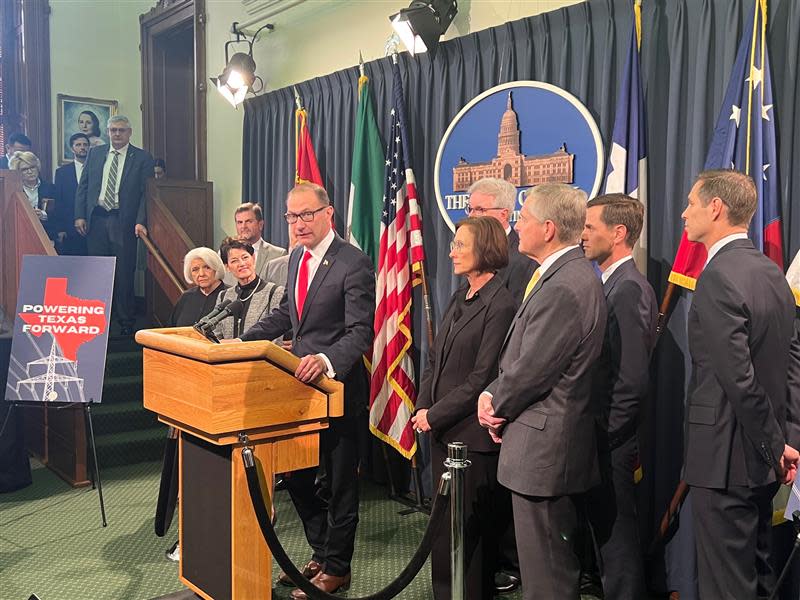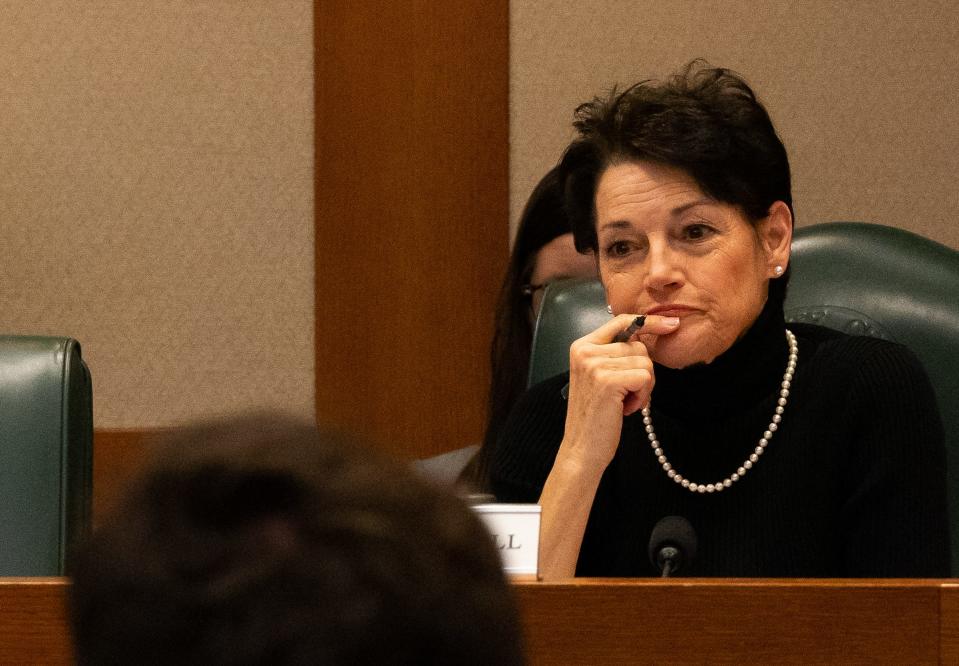Here's a look at Lt. Gov. Dan Patrick's Senate priority bills for the 88th Legislature
- Oops!Something went wrong.Please try again later.
After months of discussion, preparation and jockeying for position, the dust has settled on a list of 30 priority bills in the Texas Senate that will kick off political negotiations in the race toward the 88th regular legislative session's end May 29.
With the deadline to file bills having passed Friday, each chamber now has thousands of pieces of legislation to consider. And of the 2,565 bills filed in the Senate and 5,292 bills in the House, some are destined to become law, while many others will be forgotten on the shelf as they are sure to spark partisan vitriol.
School choice legislation, bills targeting diversity, equity and inclusion practices and professor tenure at state universities, along with removing transgender athletes' ability to participate in sports based on their gender identity and the ability for children to attend "sexually oriented performances" were several of the Senate proposals that came in under the wire Friday evening.
Meanwhile, Senate Bill 2, which proposes to reverse course and reinstitute a felony charge for illegal voting, which was dropped to a misdemeanor in 2021, and SB 3, an effort to increase the state's homestead tax exemption to $70,000 from $40,000, already have gained legislative momentum.
With a GOP-controlled chamber led by Lt. Gov. Dan Patrick, a Republican from Houston, the Senate agenda will be shepherded by Patrick's appointed allies who chair the upper chamber's 17 committees and single subcommittee.
Here's a look at a few proposed polies and a list of priority legislation:
Removal of a district attorney, judge
SB 20 defines a pattern of practice by a prosecuting district attorney that "prohibits or materially limits the enforcement of any criminal offense" as grounds for removal.
The bill from Sens. Joan Huffman, R-Houston, and Tan Parker, R-Flower Mound, embodies a pre-session request from Patrick that judges and prosecuting attorneys who "won't charge anyone with a crime" have an avenue for removal.
"We need to figure a way within the law, within the Constitution, either to move those cases to another district attorney in another county or to recall those district attorneys or those judges," Patrick said at the time.
Similarly, SB 21, also a Huffman bill, would add a judicial misconduct definition that a "persistent or willful violation" of the state's bail statute could trigger the complaint process against current or former judges.
Huffman, chair of the Senate Finance committee and member of the Criminal Justice committee, also filed SB 23, a Patrick priority bill that increases the minimum sentence for using a gun in the commission of first-, second- or third-degree felonies to 10 years.
Meanwhile, SB 27 from Sen. Bryan Hughes, R-Mineola, (and matching legislation in House Bill 19 from Rep. Andrew Murr, R-Junction) seeks to establish a new court system in Texas with the sole purpose of settling disputes between businesses.
While proponents argue the proposal would help alleviate a district court backlog, others say the model based on a centuries-old chancery court in Delaware would not translate well to Texas and its 254 counties.
Speaking with USA Today in February, Gov. Greg Abbott said, "Texas is the home of business, and so we should be the home of business courts."
Grid dependability and Texas' water supply
On Thursday, a bipartisan group of lawmakers introduced the Senate's pitch on how to best address the state's electricity needs for years to come after deadly winter storms in 2021 left millions of Texans without power for many days.
More:Senators lay out bills to fix Texas' electric grid. Here's what they're proposing.
SB 6 would create the Texas energy insurance program, an avenue meant to ensure backup generation ability during times of greatest demand and weather crises, said Sen. Charles Schwertner, R-Georgetown.
Schwertner, chair of the Senate Committee on Business and Commerce, said the bill intends to create a "low-cost loan program" to spur dispatchable energy — electricity from conventional power sources that could be fired up quickly — while creating an additional 10,000 megawatts of generation capacity, which is enough to power 7.5 million homes.

Additional measures targeting cybersecurity, payment caps and mitigation planning were also part of Schwertner's proposal.
To secure 7 million acre-feet of new water supply by 2033, Sen. Charles Perry, R-Lubbock has filed SB 28.
The proposal from Perry, who leads the Senate Committee on Water, Agriculture and Rural Affairs, would create a fund for the Texas Water Development Board to provide low interest loans to water suppliers and localities, purchase water from other states and bolster infrastructure and desalination efforts.
On Monday, the committee will meet and discuss legislation regarding the state's groundwater conservation districts, which regulate water use and aquifer protections at the hyper-local level across Texas.
Taxes, teacher incentives, health care, gender
There is unanimous Senate support for homestead tax exemption increases as proposed in SB 3 and for a cost-of-living adjustment for teachers as called for in SB 10. There is also broad bipartisan approval for SB 25 to address the state's nursing shortage.
More:Bill seeks to alleviate Texas nursing shortage through supervision reform
The nurse scholarship program proposal from Brenham Republican Sen. Lois Kolkhorst, chair of the Senate Health and Human Services committee, would allow for nurses working full- or part-time and those currently enrolled in a higher education nursing program to be eligible for loan repayment assistance. The Texas Higher Education Coordinating Board would oversee the program and determine the maximum amount for loan assistance.
Other policy areas in Patrick's priority list will not be built with bipartisan support, such as SB 14 by Sen. Donna Campbell, R-New Braunfels, and a host of Republican authors, which would ban child health plans from providing coverage for gender-affirming services.

Additionally, SB 15, from Sen. Mayes Middleton, R-Galveston, would require collegiate athletes to compete based on biological sex as marked on their official birth certificate. The bill, authored by every Republican in the Senate, is scheduled to be heard in the Senate Committee on State Affairs on Monday.
The rest of the Senate's top 30 bills
SB 1: The Senate's $288.7 billion biennium budget proposal.
SB 4: Would address the maximum compressed tax rate for school districts with 10% decrease in effort to alleviate property taxes.
SB 5: Ad valorem tax exemption for personal property used to make income.
SB 8: Would create an education savings account program to fund private education tuition and other expenses.
SB 10: Would give a cost-of-living raise for retired teachers — a $7,500 check would apply to about 186,000 retirees who are 75 and older.
SB 12: Would create a $10,000 fine for commercial enterprises that host "sexually oriented performances" in the presence of someone less than 18 years old.
SB 13: Would create local school library advisory councils and allowing parents the choice to receive notice each time the child obtains a school library material.
SB 16: Would prohibit faculty at Texas public colleges from compelling students to "adopt a belief that any race, sex, or ethnicity or social, political, or religious belief" is superior.
SB 19: Would create the Texas University Fund for state universities, including Texas Tech University and the University of Houston.
SB 22: Would establish a rural sheriff ’s department salary assistance grant program. Sheriff pay would be $75,000 and $45,000 or $40,000 for deputies under the proposal.
SB 24: Would transfer to the Health and Human Services Commission certain powers and duties from the Department of Family and Protective Services for "family support."
SB 26: Would create an incentive payment program for nursing facilities that provide behavior health services and support.
SB 29: Would prohibit local governments from implementation or enforcement of a vaccine mandate, mask requirement, or private business or school closure.
SB 30: Would allow for supplemental appropriations and reductions in appropriations, gives direction and adjustment authority regarding appropriations.
This article originally appeared on Austin American-Statesman: Texas Legislature: Senate files bills, priorities are wide ranging

